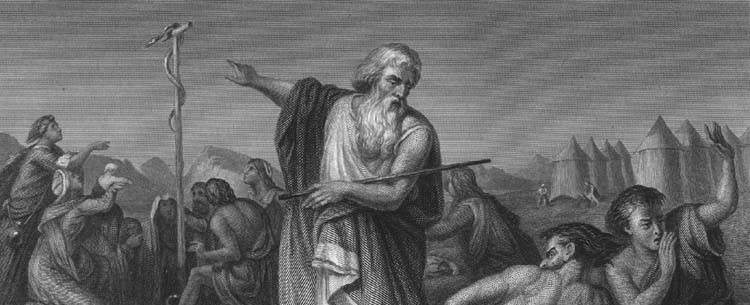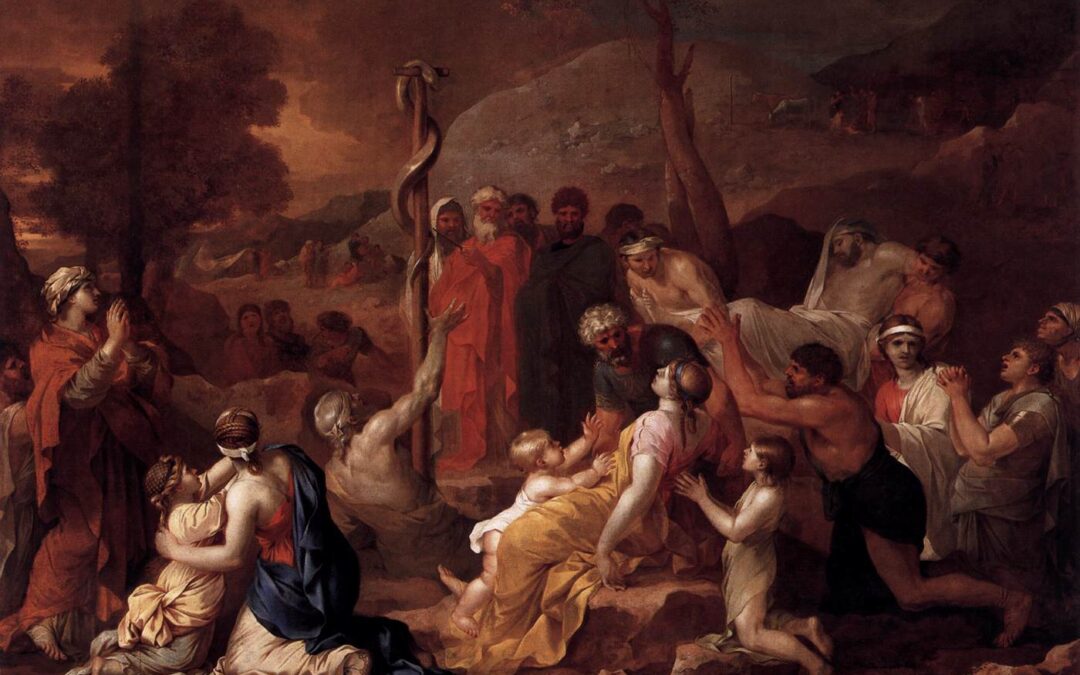
by Bret Capranica | Aug 4, 2011 | Biblical Studies, Featured Articles, Pastoral Ministry, Preaching
Carefully Think Think back through what we discussed last week in Numbers 1-25 and the illustrations of Israel”™s mere external obedience (1-10) and their growing internal unfaithfulness (11-25). What glimpses of God”™s mercy and faithfulness to them were evident, even in their judgment and discipline? Read through Numbers 26-36 and summarize the major ideas that you see here. Which generation of Israelites are they being given to? Why would they need to hear these things again? Prayerfully Meditate The New Testament mentions a number of sections found in the book of Numbers. Read each passage below and see if you can discover where in Numbers the New Testament author is referring and what is the corresponding lesson for a Christian. John 3:1-15 1 Corinthians 10:1-13 Hebrews 3:7-4:16 How has God demonstrated specific acts of grace and mercy to you this past week? How has he treated you in regard to specific acts of sin you have committed against Him? How is God”™s faithfulness affecting you, especially in light of the times of unfaithfulness you have seen in your heart and life this past week? How should this affect your worship as we gather this Sunday? Intentionally Act Confess any sin you have been made aware of, reminding yourself of what Christ did on the cross to satisfy God”™s righteousness and what God has done to give you Christ”™s righteousness. Pray that you will be sensitive not only to any unfaithfulness in your heart, but especially to the faithful acts of God displayed in your life in unique and specific ways this past week. List them. Use these in an...

by Bret Capranica | Jul 28, 2011 | Biblical Studies, Featured Articles, Pastoral Ministry, Preaching
Carefully Think The biblical book of Numbers has several of the most memorable scenes from Israel”™s early days after the Exodus. Read through the following sections and see if you can summarize the main idea and list any principles that you think would apply to God”™s people in general: Numbers 11 Numbers 12 Numbers 13-14 Numbers 16 Numbers 20 Numbers 21-25 Prayerfully Meditate The New Testament mentions a number of sections found in the book of Numbers. Read each passage and see if you can find where in Numbers the New Testament author is referring to and what the corresponding lesson for Christians is. John 3:1-15 1 Corinthians 10:1-13 Hebrews 3:7-4:16 Intentionally Act From what you have read in the passages above, what sin needs to be acknowledged before God? What elements of praise should you express to Him? For what can you be specifically grateful in light of what you have been meditating upon from Numbers? Pray for those who will attend this Sunday and do not personally know the saving work of Christ. Pray their hearts will be opened to His mercy and changed through the Spirit”™s conviction. Pray that God”™s people will be appropriately challenged and encouraged, equipped to serve Christ well. Pray for those leading the service on Sunday (Dawson Bryant, music; Mark Krystyniak, prayer and Scripture reading, Bret Capranica, teaching). Pray that they will assist the congregation in acceptable praise to Christ. Pray for the others who will also be assisting to ensure our worship honors Christ (instrumentalists, visual and audio techs, ushers, etc.). Meditate on the lyrics of the songs for Sunday and...

by Bret Capranica | Jul 27, 2011 | Biblical Studies, Pastoral Ministry, Preaching, Video
Make Leviticus practical. In Leviticus last week we said it covered 5 ways we live with God – or that He lives with us: sacrifice, mediation, purity, atonement, and holiness. Jesus fulfills all of those. The sacrificial system made atonement very practical, vivid, and constant for the Jewish people. How can it be for us. CJ Mahaney’s book, The Cross-Centered Life, suggests a few ways to preach the gospel to yourself regularly: Memorize the gospel Pray the gospel Sing the gospel Review the effects of the gospel Study the Gospel Books recommended in the video: The Discipline of Grace, Jerry Bridges The Cross-Centered Life, C.J. Mahaney The Cross of Christ, John R. W....

by Bret Capranica | Jul 21, 2011 | Biblical Studies, Featured Articles, Pastoral Ministry, Preaching
Carefully Think Read through Leviticus 1-5 and make a list of the various offerings Israel was to give. What was the role of the priest? What did the one making the offering have to do? What was the overarching reason for all of the offerings? Read Leviticus 10. What was Nadab and Abihu”™s failure? What does this suggest about God? What does it suggest about people and their approach to God”™s commands? Read Leviticus 16. What is the main theme of this chapter? Who”™s sin was covered? How? What do you learn about how sin is atoned for in this chapter? Read Leviticus 18-20. What is the overarching motive mentioned over and over that should move the Israelites to obedience? Prayerfully Meditate According to Leviticus, how much of life was treated as worship? What does this suggest about how God”™s people should think about life? According to Leviticus how do you know that God took public worship so seriously? What does it suggest to us about our approach to worshiping God? Read Hebrews 8-10. In what ways is Jesus the fulfillment of what you read in Leviticus? Read Matthew 5-6. In what ways is Jesus the fulfillment of what you read in Leviticus? What should the most significant effect of Leviticus be on your approach to worship this Sunday? Intentionally Act What areas of sin have been brought to your mind in contemplating Leviticus and its affect on worship and life? Confess those specifically to God in prayer. Respond in prayer to God for what you have learned from Leviticus and Hebrews (mentioned above) and the role Jesus plays...

by Bret Capranica | Jul 18, 2011 | Biblical Studies, Bookreviews, Featured Articles, General Theology, Ordinary Pastor, Video
Cap-Review: The Glory of God from Bret Capranica on Vimeo. An Ordinary Pastor’s Brief Review of The Glory of God: Christopher W. Morgan and Robert A. Peterson have blessed the church with a helpful volume in Crossway”™s “Theology in Community” series, entitled, The Glory of God. The aim of the book is to ask and answer the question, “what does the Bible teach” about God”™s glory (20). The editors seek a two pronged attack in achieving their aim. Chapters 1-6 seek to “help us glorify God in our minds by focusing on biblical and theological truths related to his glory. Chapters 7 and 8 help us rejoice in our hearts as they illuminate how these truths about God”™s glory shape our view and approach to the church, pastoral ministry, and missions” (21). Nine different authors, all instructors at theological institutions, contribute to the volume. The audience is intended to be college and seminary students and those pastors with such training (14). The book is arranged by addressing the subject of God”™s glory historically, then from the perspective of the Old Testament, New Testament, the Synoptic Gospels/Acts/General Epistles, John”™s Gospel/Revelation, and Paul”™s Epistles. The book then contains a chapter on the overall theology of God”™s glory, and concludes with chapters on pastoral and missional implications of God”™s glory. I found the structure and arrangement of the book helpful. Moving from an historical sweep to looking at how God”™s glory is described in detail from the Old Testament through the emphases in various New Testament genre, then to a more global evaluation of the biblical material, ending with more practical implications was...

by Bret Capranica | Jun 30, 2011 | Biblical Studies, Featured Articles, Pastoral Ministry
Carefully Think Read through Exodus 1-19. As you read begin underlining and make a list of the actions you see from the following: God (what does the text say he does), Moses (how does he respond to God, Israel, and Pharaoh), Pharaoh (how does he respond to Moses and God), and Israel (how do they respond to Moses and God). If you are limited for time, concentrate on the plague accounts of chapters 7-12. What is the chief purpose behind God”™s bringing the plagues (pay attention to the “so that” phrases)? How would you summarize the theme of Exodus 1-19? Prayerfully Meditate What do you learn about how God works within the actions of people from reading Exodus 1-19? What does this suggest is true about how God is presently working in our world and in your life? What do you learn from Israel”™s responses to Moses and God throughout these chapters? In what ways do we respond similarly or differently? What was God revealing to Moses, Israel, and Egypt about Himself? How should that impact you? Intentionally Act Pray in response to what you have learned from Exodus 1-19. What sin should you confess? How could you respond in unique praise for who God is? How would any of these lessons impact the way you are currently praying for others? Consider how what you have learned about God should impact the way you worship Him with God”™s people this Sunday. Write out a few responses. Pray for those in our gathering this Sunday who do not know Christ. Pray that they will see God”™s greatness and their need...













